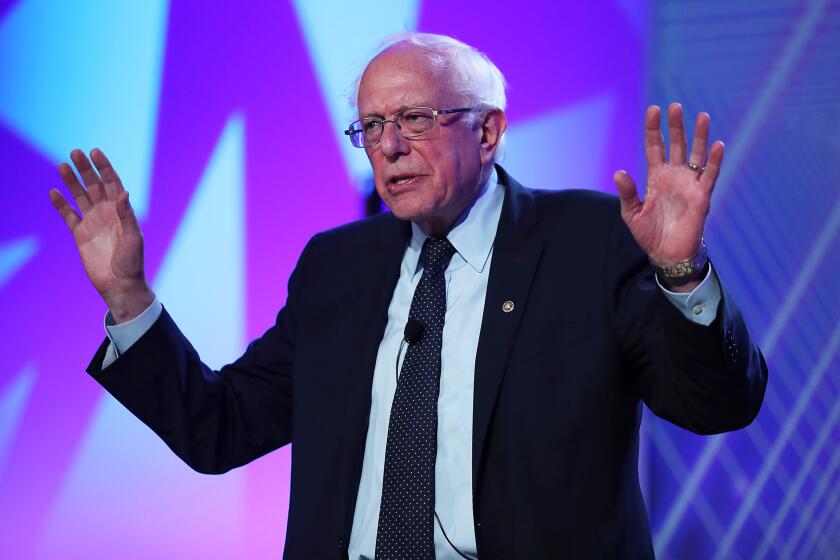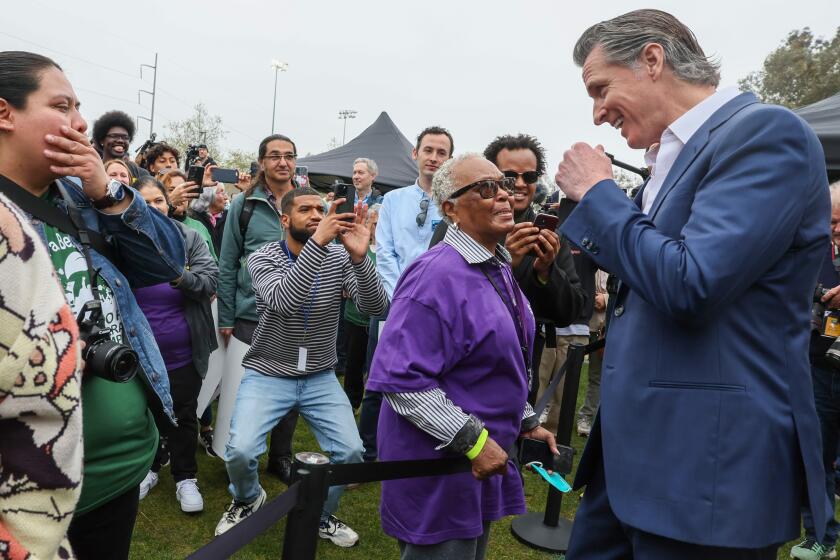Governor Signs Bill Barring State From Buying Foreign Goods Made by Slave Labor
A bill making California the first state to outlaw purchases of goods produced in slave-labor camps in China and other foreign nations was signed into law late Monday by Gov. Pete Wilson.
The anti-slave labor bill--strongly supported by human rights activist Harry Wu, who spent 19 years as a political prisoner in Chinese labor camps--is regarded by backers as largely a symbolic breakthrough but also a potential economic weapon.
Although it applies solely to state government purchases, the law is intended to build economic pressure against exploitative foreign factories in such countries as India, Pakistan and Brazil, as well as China. It also is expected to galvanize existing efforts to pass similar statutes in such states as New York and Massachusetts.
Critics of the bill, however, questioned whether it will be enforceable because of the difficulty in determing what goods come from slave labor camps.
Wilson, who kept the law’s backers in doubt for weeks as to whether he would sign or veto the measure, issued a news release saying, “Unfortunately, the practice of forced, slave or convict labor is not uncommon in our world. . . . These violations of humanity will not be tolerated. If you do business with a company that uses child or slave labor, you will not do business with the state of California.”
The bill’s principal author, Assemblywoman Liz Figueroa (D-Fremont), represents the Milpitas district where Wu, a naturalized U.S. citizen, lives. Figueroa said she believed it was important for the state to express its support for Wu’s human rights campaign and to protect California workers from unfair competition involving cheap goods made in slave labor camps.
But a spokesman at the Chinese Consulate in San Francisco, Wang Yusheng, has said accusations that his nation exports products made by prisoners are “groundless.”
“China strictly prohibits the export of products made by prison labor,” he said, because of a longtime pact with the United States.
The Chinese spokesman called Wu “a criminal who violated the law,” and said his testimony decrying labor camp conditions “was nothing but distortion of the facts.”
The anti-slavery bill, approved overwhelmingly by the Assembly and Senate, will prohibit the state’s purchase of foreign-produced equipment, supplies or any other materials made by “convict, forced or indentured labor.” Contractors that “knew or should have known” that goods furnished to California were produced by such labor could have their deals voided by the state. (Supporters of the law said that they had no estimate of what fraction of the state’s $4-billion annual purchasing budget is spent on goods produced in China or other foreign nations.)
In addition, contractors could be barred from doing business with the state for up to 360 days and would face fines of $1,000 or up to 20% of the value of the goods provided. Public works contracts were excluded from the bill, to head off opposition from critics worried that minor violations would substantially drive up the cost of construction programs.
The federal Smoot-Hawley Tariff Act of 1930 prohibits the import of goods produced by forced labor. But proponents of the California bill, AB 2457, say the U.S. law generally is not enforced and imposes light penalties.
The measure received strong support from organized labor and was opposed principally by the Wilson administration’s Department of General Services, the main purchasing arm of state government. The agency maintained that the bill might scare off contractors from bidding on state contracts by increasing red tape.
Also, the agency said, the bill could constitute an illegal intrusion on the federal government’s handling of foreign policy and burden the state with the extra cost of investigating complaints.
To head off some opposition and to minimize costs for taxpayers, the bill was amended to limit the scope of state investigations of possible violations. State agencies are permitted to look into only those cases where a party such as a human rights organization, union or competing contractor has filed a complaint. Moreover, rather than launch sweeping investigations, the affected state agencies will consider only the complaints and the replies from accused contractors in making decisions.
The law does not apply to some spending by agencies that are constitutionally exempted from California’s public contract code, including the University of California. Backers of the law are expected to push to apply the restrictions to those excluded agencies later on.
Skeptics such as Nicholas Lardy, a China economic specialist at the Brookings Institution in Washington, expressed doubt that California could enforce the law effectively. “How are California authorities going to enforce it when even federal authorities don’t have the data to do it?” he asked.
“There’s nobody, including Harry Wu, with good data on what portion of Chinese goods or exports are produced where the labor could be classified as prison labor,” Lardy said.
The measure takes effect Jan. 1.
More to Read
Get the L.A. Times Politics newsletter
Deeply reported insights into legislation, politics and policy from Sacramento, Washington and beyond. In your inbox three times per week.
You may occasionally receive promotional content from the Los Angeles Times.






